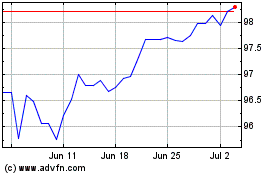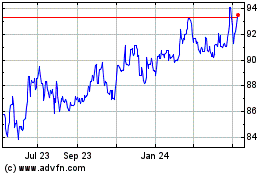Australian, NZ Dollars Fall As Risk Sentiment Worsens
February 04 2022 - 1:50AM
RTTF2
The Australian and NZ dollars fell against their major
counterparts in the European session on Friday, amid lingering
worries over inflation and looming central bank rate hikes.
Investors digested comments from European Central Bank president
Christine Lagarde signaling a major policy shift. Following
Lagarde's hawkish remarks, money markets are pricing in nearly 50
basis points of tightening by the end of this year.
The Bank of England raised its key rate again and several
policymakers preferred a 50 basis point increase to tackle
inflation.
Investors awaited U.S. jobs data due later today, which is
expected to show a gain of 150,000 jobs in January. The
unemployment rate is expected to hold at 3.9 percent.
The Reserve Bank of Australia raised its inflation outlook
citing robust demand for housing and the increases in prices of
durable goods and fuel.
In the latest Statement on Monetary Policy, the central bank
said underlying inflation picked up in recent quarters and is
forecast to increase further to 3.25 percent in mid-2022, largely
reflecting upstream cost pressures amid strong demand in housing
construction and the durables goods sector.
The aussie depreciated to 3-day lows of 0.7097 against the
greenback and 0.9021 against the loonie, down from its prior highs
of 0.7152 and 0.9063, respectively. The aussie may locate support
around 0.68 against the greenback and 0.89 against the loonie.
Pulling away from its previous highs of 1.6000 against the euro
and 1.0718 against the kiwi, the aussie dropped to a fresh 2-month
low of 1.6165 and a 4-day low of 1.0680, respectively. The next
immediate support for the aussie is seen around 1.64 against the
euro and 1.045 against the kiwi.
The aussie reversed from an early high of 82.22 against the yen,
reaching as low as 81.53. The currency is poised to challenge
support around the 80.00 mark.
The kiwi weakened to 0.6629 against the greenback and 76.13
against the yen, off its early 9-day high of 0.6683 and a 2-week
high of 76.78, respectively. The kiwi is seen finding support
around 0.63 against the greenback and 74.00 against the yen.
The kiwi fell to more than a 1-year low of 1.7299 against the
euro, reversing from an early high of 1.7137. If the currency drops
further, 1.75 is possibly seen as its next support level.
Looking ahead, U.S. and Canadian jobs data and Canada Ivey PMI,
all for January, will be released in the New York session.
NZD vs Yen (FX:NZDJPY)
Forex Chart
From Mar 2024 to Apr 2024

NZD vs Yen (FX:NZDJPY)
Forex Chart
From Apr 2023 to Apr 2024
